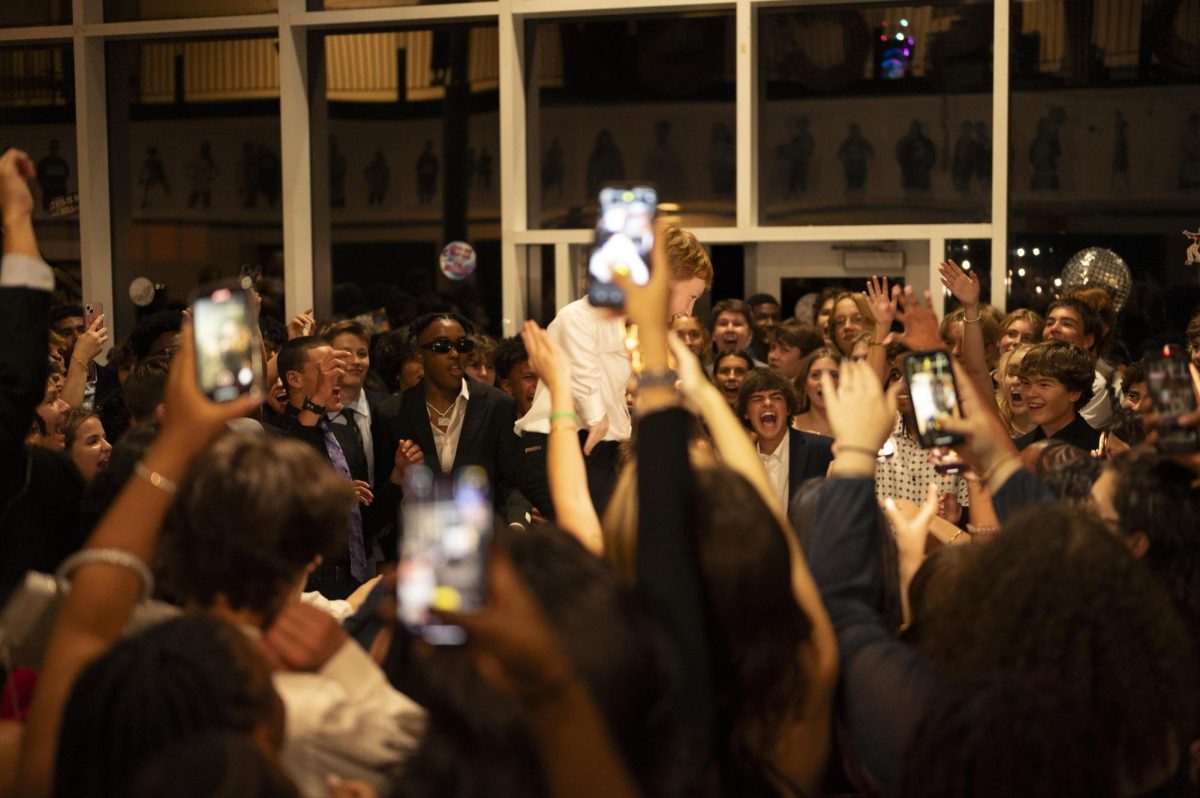The Album of a Generation: Kendrick’s TPAB
February 17, 2023
Kendrick Lamar is an undeniable icon in modern music. Not only has his phenomenal discography completely changed and revitalized the way Hip-Hop is experienced and thought of, but his brutally graphic and honest lyrics have created a space for vulnerability in the genre not before popularized. The genesis of this precedent is his 2015 masterpiece To Pimp A Butterfly. Sometimes dubbed the greatest Hip-Hop album ever, this deeply emotional and at times horrifying record illustrates Kendrick switching from the trappy, west coast inspired tracks of good kid, m.A.A.d. city to a more funk and soul based sound. Over these beats Kendrick gets introspective, describing his inner conflict without censorship.
Before going track by track, it’s important to understand the point of TPAB. The sounds and ideas presented in this project were essentially unheard of in Hip-Hop (especially mainstream Hip-Hop) at this point. His previous album, good kid, mA.A.d city, used 90s west coast rap inspired beats and hardcore descriptions of Kendrick’s Compton upbringing to construct a tougher, trap inspired sound. Although GKMC is a masterpiece in its own right, TPAB is generally considered the more important of the two.
Throughout this record we watch Kendrick struggle to resist the temptations of two characters: Lucy (Lucifer) and Uncle Sam. These two characters represent luxury and capitalism, and at two points in the album Kendrick gives them monologues, saying, “What you want you? / A house or a car? / Forty acres and a mule, a piano, a guitar? / Anything, see, my name is (Uncle Sam on your dollar/Lucy, I’m your dog) / Motherf***** you can live at the mall”. Throughout this project one experiences the journey of Kendrick tearing himself apart and building himself back up again, clouded by shame, trauma, and material desires. This article will do an analysis of the most important songs on the project.
Wesley’s Theory
The first track, a funky homage to Kendrick’s distaste for the music industry and the way “black creators are used by the system around them” as CHS student John Proulx put it, starts off with Josef Leimberg posing a set up question: “When the four corners of this cocoon collide / You’ll slip through the cracks, hoping that you’ll survive / Gather your wit, take a deep look inside / Are you really who they idolize? / To pimp a butterfly”. These lines set up the entire album, giving Kendrick a chance to expand on his inner struggles and figure out if he really is who his fans idolize. In the chorus, Kendrick compares the music industry to his first experience in a romantic relationship: at first he loved it, but now he just wants to have sex, an analogy to making hits. He furthers this message in his first verse, talking about all the glamorous things he plans to do after getting signed. This message is flipped in the second verse, when Uncle Sam begins to tempt him to give into vanity and excess. By the end of the second verse Kendrick is scrambling to buy as much of everything he can, influenced by the capitalist messages he’s hearing.
King Kunta
“The story of struggle and standing up for what you believe in” is how Kendrick described this song in an interview with NME. He studied James Brown during the creation of this track, which is shown in the funky bass and drums that dominate the song. The name is a reference to the protagonist of Roots: The Saga of an American Family, a 1976 novel about an African man, named Kunta Kinte who is enslaved and brought to America. However the story goes deeper, as this man was one of author Alex Haley’s ancestors, which Kendrick reflects in the meaning of the song. Kinte was a rebellious character, and this track is both rebellious and proud, and an overall positive track compared to the surrounding ones. The end of this song is our first introduction to the poem that is built throughout the album, as we get the first two lines: “I remember you was conflicted / misusing your influence”.
These Walls
In the modern age almost everybody is trapped in some way. Whether that be the walls of one’s cubicle, a prison cell, or their own mind, many people feel trapped within boundaries that they can’t (or don’t try to) control. Kendrick Lamar is referencing three walls: the walls of a prison cell, the walls of his own consciousness, and the walls of a woman’s genitals. These three boundaries, as Genius put it, represent “Kendrick having sex with a woman who has children with a man in jail for killing one of Kendrick’s friends. Kendrick views this as an act of revenge for his slain friend, but he also has a bad conscience about using his fame and power to seduce someone for that purpose”. There are a lot of important themes here. For one, Lucy is baiting Kendrick into doing a thing that he knows is morally wrong, which is shown in the line added to the poem at the end: “Sometimes I did the same”. The scary thing about this relationship is that Kendrick isn’t doing it out of any sort of positive feelings, but out of hate.
u
Perhaps the most emotionally graphic, disturbing song in all of rap music, u is a horrifying portrait of Kendrick’s inner conflict, where he shouts at himself, breaking down over his guilt and perceived failures. The first 20 seconds are Kendrick screaming, before the repetitive screamy hook comes in, where he repeats the line “loving you is complicated” 10 times. In the first verse he yells at himself over his bottled up shame, splitting his personality into two. By the time the second verse rolls around he’s completely broken down, drunkenly fighting with himself, which analogizes his consciousness to a fight in a relationship.
How Much a Dollar Cost
In Ancient Greece it was custom to act hospitable towards every stranger you encountered. If a poor man asked you for food it would most likely be met with an overwhelming yes. This was out of fear for the gods, who commonly manifested themselves as mortals and then tested people on their morality through actions like the aforementioned one. In this song Lucy and Uncle Sam have traumatized Kendrick, who is trying to escape their grip, when he encounters a homeless man in a gas station parking lot. The homeless man begs for a single dollar, which Kendrick refuses in disgust. He believes that anything he gives the man will be spent on drug addiction. The homeless man becomes angry, which disgusts Kendrick more, and results in him insulting the man. The homeless man then reveals himself to be God, who then says that the price of a dollar is Kendrick’s spot in heaven. Kendrick uses this story to show the distrust that his upbringing instilled in him, and how his experience in a crack-plagued 90s Compton affected his perception of the world.
The Blacker The Berry
Kendrick Lamar is a hypocrite. At least, that’s what he insists on, throughout this synth filled cut of pure funky rage. Everything in this track is intense, from Assassin’s chorus sung in Jamaican patois, to Kendrick’s hoarse half-yelling that he employs throughout the song. The bass drums drone loudly as an anxiety inducing synth causes a feeling of uneasiness. Kendrick promises us at the start of each verse that we’ll find out why he’s a hypocrite, followed up with statements like “Once I finish this witnesses will convey just what I mean” or “When I finish this if you listenin sure you will agree”. In the last few lines he explains his hypocrisy: “So don’t matter how much I say I like to preach with the Panthers / Or tell Georgia State ‘Marcus Garvey got all the answers’ / Or try to celebrate February like it’s my B-Day / Or eat watermelon, chicken and Kool-Aid on weekdays / Or jump high enough to get Michael Jordan endorsements / Or watch BET cause urban support is important / So why did I weep when Trayvon Martin was in the street? / When gang banging make me kill a ***** blacker than me? / Hypocrite!”
This is Kendrick’s diss track on Uncle Sam. It’s an homage to his past conflicts, from the deep depression we saw in u, to his later recovery and then stability in tracks like i or Mortal Man. Kendrick rids his system of the demons that have haunted him, attacking the racist ideals that Uncle Sam perpetuates.
By the end of this album it feels like you’ve just finished a movie. The finished poem gives a sense of clearance and the entire album is connected in a way it wasn’t previously. Here’s the entire thing: “I remember you was conflicted / Misusing your influence / Sometimes I did the same / Abusing my power, full of resentment / Resentment that turned into a deep depression / Found myself screaming in the hotel room / I didn’t wanna self destruct / The evils of Lucy was all around me / So I went running for answers / Until I came home / But that didn’t stop survivor’s guilt / Going back and forth trying to convince myself the stripes I earned / Or maybe how A-1 my foundation was / But while my loved ones was fighting the / Continuous war back in the city, I was entering a new one / A war that was based on apartheid and discrimination / Made me wanna go back to the city and tell the homies what I learned / The word was respect / Just because you wore a different gang color than mine’s / Doesn’t mean I can’t respect you as a black man / Forgetting all the pain and hurt we caused each other in these streets / If I respect you, we unify and stop the enemy from killing us / But I don’t know, I’m no mortal man, maybe I’m just another *****”. Every time that a new line is added to the poem in a song it has a specific relevance to that song or the next. The intricacy put in to this project is on a level of artistry akin to the greatest albums of the last century.




